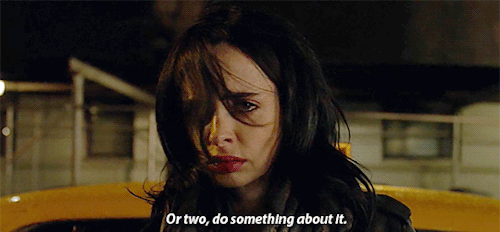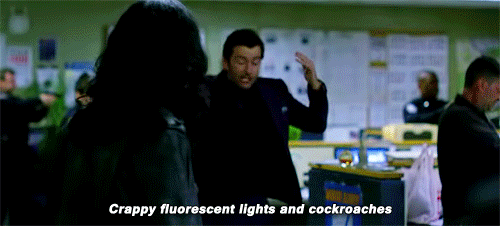After having watched the finale of Jessica Jones, it feels like all the scattered pieces of thematic conflict have come together, and a coherent message emerged. In fact, it’s explicitly brought up by the nurse as she talks to Jessica about her superpowered friend. And in this conversation, we get a better explanation of why Jessica can’t be anyone’s hero: she doesn’t know if what she’s doing is right or wrong. We’ve seen her struggle with guilt all season long as Kilgrave kills innocent people around them as a way to threaten her to act a certain way. The recurrence of this makes her feel like she leaves a trail of death behind her, making her question if killing Kilgrave is worth all the innocent people that may die because of it. This hesitation suggests to the audience that the line between good and bad is not always so clear-cut, and I think this is the main theme of the show. Sometimes, doing the right thing means putting a lot of people in danger.
In the conversation with the nurse, Jessica asks her, “How is he so sure he’s the good guy?”, referring to the nurse’s friend. In that moment, we get to see the question she’s been asking herself all this time, is she even the good guy? With all that blood seemingly on her hands, it’s understandable why she has moments of self-doubt. In fact, in the final battle, she must first pass through a crowd of people ordered to kill each other, to then defeat him by putting the person she cares about most in danger. This is what made Kilgrave so powerful: he could control Jessica by manipulating her guilt. As long as she felt guilty, he was untouchable. So, in a very un-glorious fashion, she must ignore the innocent lives in danger to finally kill Kilgrave. No wonder she doesn’t feel like a hero, even after terminating such a monster. As season 1 rolls to a close and Jessica deletes the messages of people asking for her help, we see that even after everything, she doesn’t see herself as the good guy everyone else does.

Above: Here, Jessica must hand over the most important person to her, her adoptive sister Trish, in order to kill Kilgrave.









 other comic characters and heroes. There is also the part where Jessica Jones was made to be apart of the Marvel Defenders saga where she is only one of 4 stories or shows that are made and eventually lead to the Defenders TV show/fighting force. So basically a huge part of the underlying plot points going throughout the show is working Jones in with the other characters that she is destined to meet.
other comic characters and heroes. There is also the part where Jessica Jones was made to be apart of the Marvel Defenders saga where she is only one of 4 stories or shows that are made and eventually lead to the Defenders TV show/fighting force. So basically a huge part of the underlying plot points going throughout the show is working Jones in with the other characters that she is destined to meet.






